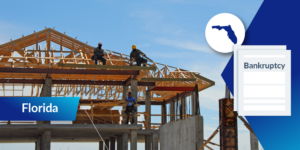
Yet another Florida property insurance company filed for bankruptcy last week, leaving 80,000 homeowners scrambling to find new policies just as hurricane season begins. The bankruptcy comes just weeks after Florida Governor Ron DeSantis signed legislation from the state legislature’s special session to address Florida’s growing property insurance crisis.
Southern Fidelity is the fourth Florida insurer to go under in just the last four months, joining Lighthouse Property Insurance Corporation, Avatar Property and Casualty Insurance, and St. Johns Insurance Company, and represents the latest in a trend of bankruptcies going back to 2017.
While the passed legislation is expected to reform the insurance industry for the better, insurers, homeowners, and restoration contractors may continue to struggle for some time as the industry adjusts, and especially as the state moves deeper into hurricane season.
Florida’s property insurance industry has been hammered in recent years by costly hurricanes and rampant fraud and litigation and has posted losses of over $1 billion in each of the last two years. As a result, a growing list of insurers has either filed for bankruptcy, become more selective about issuing policies, or left the state entirely.
Learn more: Florida Property Insurance Crisis Poses Risk to Restoration Contractors
To combat these issues, the Florida state legislature’s recent special session passed a number of new initiatives meant to provide relief to both property insurance companies and homeowners. Most of the changes are aimed at making property insurance more affordable and available, as well as curbing fraud and pervasive litigation in the market.
Restoration contractors can likely expect to be impacted by these changes, both directly and indirectly.
Some key takeaways include:
- A $2 billion reinsurance fund has been authorized to cover insurers’ losses from hurricanes. All eligible and financially-sound Florida property insurance companies must participate in this program.
- $150 million has been approved under the My Safe Florida Home Program for hurricane mitigation inspections and grants for hurricane retrofitting. This will provide financial incentives for homeowners in the form of free home inspections and grants for retrofitting, reducing the vulnerability to damage.
- Contractors must now tread carefully when dealing with roofing claims. At risk of new felony charges, contractors can no longer “encourage or induce” consumers to make a roof damage claim unless they provide certain information to the consumer beforehand, and fraudulent claims will be heavily penalized.
In short, the legislation should provide a windfall to struggling insurance companies as hurricane season enters full swing. Large funds have been allocated to provide homeowners cheap access to inspections and retrofitting in order to mitigate damage and keep repair costs low.
It may be too early to say if this will result in less significant repair work to go around, but restoration contractors should hopefully be able to operate — and get paid — in a more stable insurance market moving forward.
For contractors involved in retrofitting homes for hurricanes, this could provide a boost in revenue sources. Under the My Safe Florida Home Program, every dollar spent by a homeowner is matched by the government up to $10,000, providing a huge incentive to have more work done.
However, it’s important for Florida contractors to be more careful under the new legislation, especially those involved in roofing claims.
Insurance companies have pointed to fraudulent roofing claims as a key source of their financial losses in recent years, and legislators are hoping to crack down on pervasive and unjustified claims. If a contractor misrepresents a consumer’s rights or files a claim fraudulently, it can be charged with a third-degree felony.
While some Florida Democratic lawmakers have criticized the legislation for not doing enough, it seems the state was eager to pass something before the coming hurricane season. The loss of several property insurance companies has driven hundreds of thousands of Florida residents — 463,000 in the last two years — to the state-owned Citizens Property Insurance, which is meant to be the insurer of last-resort.
Other hurricane-prone states are unfortunately in a similar position — recently, tens of thousands of Louisiana residents received notice that their insurance policies would be canceled in the coming weeks as three insurance companies announced they would be shutting down.
With hurricane season bearing down on much of the southeast, Florida legislators are hopeful these measures will provide some stability to the state’s property insurance market.
Unfortunately for Southern Fidelity customers, the insurer announced earlier this month that it would not be able to purchase reinsurance in time for the coming hurricane season, and would be canceling its policies.
However, if the measures are successful, moving forward the legislation may offer new revenue streams for certain types of contractors and provide a layer of protection for contractors dependent on payment from insurers.